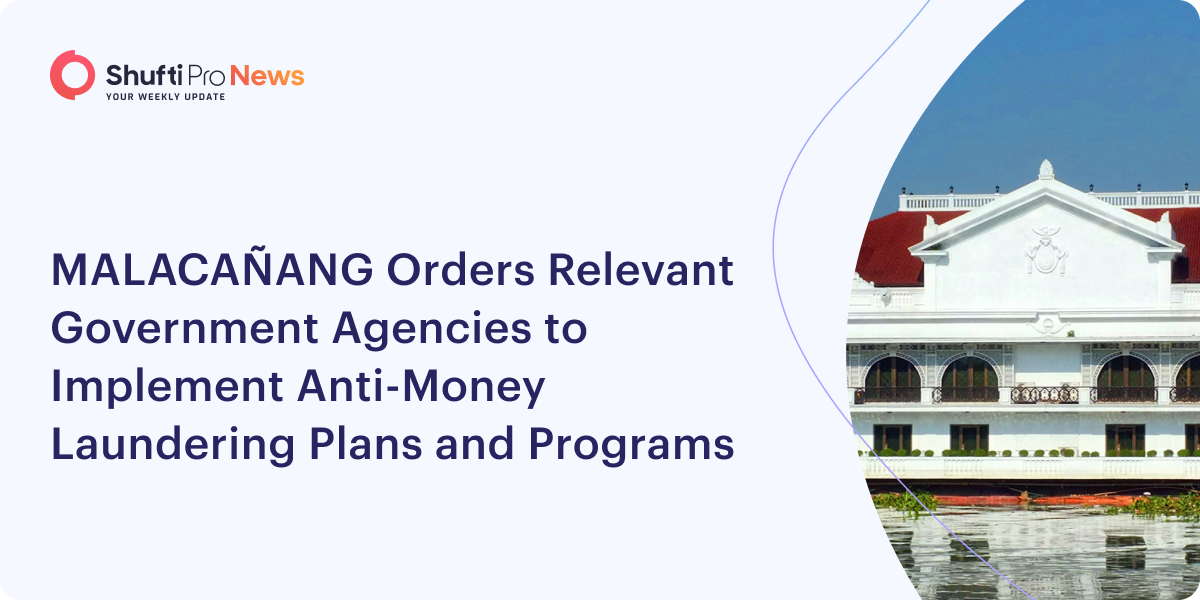MALACAÑANG Orders Relevant Government Agencies to Implement Anti-Money Laundering Plans and Programs

Aiming to exit the Financial Action Task Force’s (FATF) grey list by January 2024, MALACAÑANG Palace, the official residence and principal workplace of the president of the Philippines has directed all relevant government agencies to implement anti-money laundering, anti-terrorism financing, and anti-proliferation financing plans.
President Ferdinand R. Marcos, Jr. ordered federal government agencies to implement plans and programs to combat money laundering, terrorism financing, and proliferation financing. The National Anti-Money Laundering, Counter-Terrorist, and Counter-Proliferation Financing Strategy was updated for 2023-2027.
Additionally, the order included activities related to combating proliferation financing within the scope of the national committee. The proliferation of weapons of mass destruction is financed by raising funds or moving other economic assets.
According to the order, “The adoption of an updated NACS will strengthen existing measures to improve the effectiveness of the country’s anti-money laundering, counter-terrorism financing and counter-proliferation financing (AML/CTF/CPF) regime and allow the Philippines to exit the FATF grey list.”
AMLC has welcomed the executive order and noted that it demonstrates the government’s “strong high-level commitment” to strengthening efforts against “dirty money.”
The AMLC stated, “The NACS 2023-2027 provides strategic direction and coordinated efforts in addressing the remaining International Cooperation Review Group (ICRG) action plan items to exit the FATF grey list.”
Last month, the FATF reintroduced the Philippines to its grey list of countries to monitor closely for money laundering and terrorist financing risks. “All relevant government agencies, including supervisors, regulators, law enforcement/intelligence agencies and prosecutors, are directed to formulate and implement relevant strategy plans and programs to execute the NACS 2023-2027, and to implement the ICRG action plans swiftly,” the AMLC further stated.
AML/CFT assessments conducted by international agencies identified deficiencies within the Philippines, and this strategy seeks to improve mechanisms for identifying, investigating, and prosecuting terrorism financing, money laundering, as well as enhancing and implementing the framework for the prevention of weapon proliferation.
AML/CTF will also enhance risk-based supervision of financial institutions, nonfinancial businesses, and designated professions, improve the ability of competent authorities to obtain beneficial ownership information, and increase public awareness of the issue.
The National Administrative Control System (NACS) has been adopted by the Duterte administration this year. Since June 2021, the Philippines has been on the grey list of FATF because of its insufficient strategy for tackling terrorism funding, money laundering, and proliferation financing.
Congress will be asked to approve by December several legislative measures proposed by the Marcos administration that would relax bank deposit secrecy rules and regulate the use of financial accounts.
Suggested Reads:
DIA WARNS AUCKLAND REAL ESTATE FOR LAX MONEY LAUNDERING PREVENTION
HM TREASURY CONSULTS UK GOVERNMENT ON AML SUPERVISION REFORMS

 Explore Now
Explore Now













